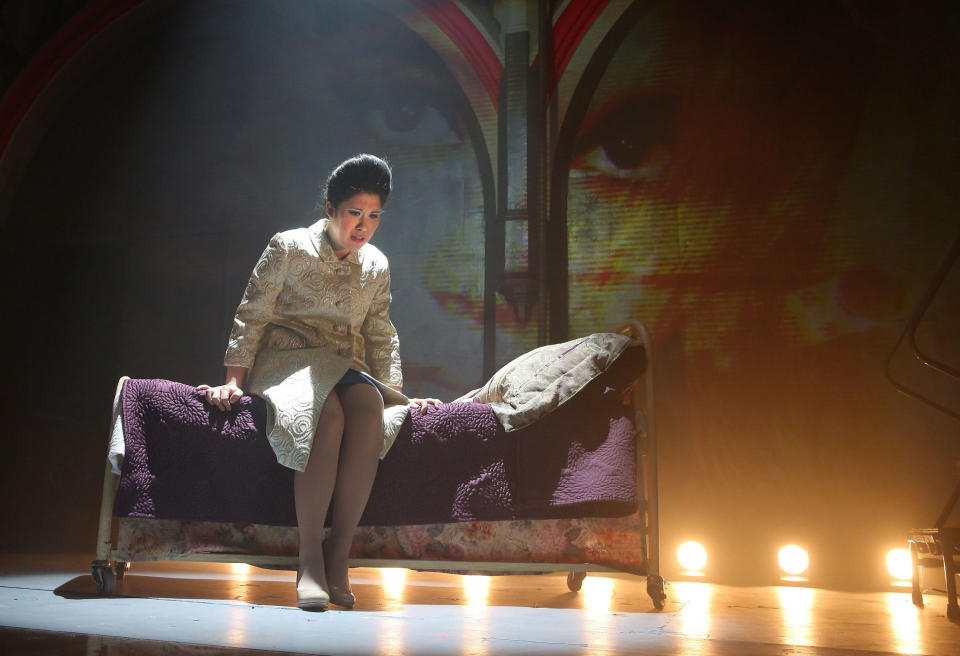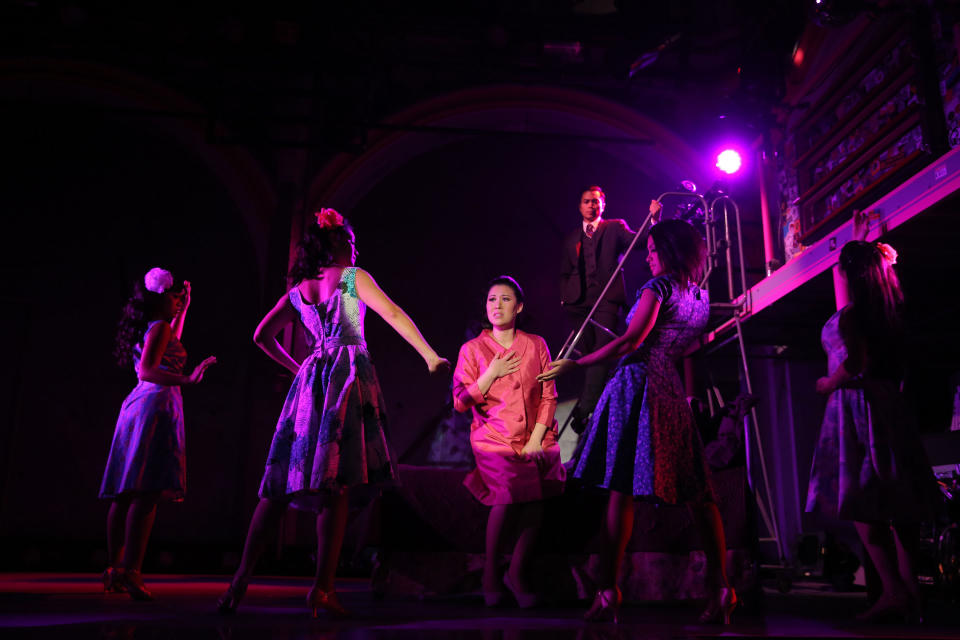Review: David Byrne revisits disco in new work
NEW YORK (AP) — Given her legendary reputation for extravagance, Imelda Marcos seems a fitting subject for David Byrne's splashy new disco musical "Here Lies Love," a bright, novel production with a bold disregard for modesty and convention.
The price of admission will get you in the door, but you won't get a seat in the standing-only, dancing-encouraged audience. The Public Theater's LuEsther Hall venue, where the show opened Tuesday, has been transformed into a beaming night club with strobe lights, flat-screen displays, wall-to-wall digital projections, artificial smoke and a DJ perched high above the dance floor.
With a stage against each of the four walls, it is difficult at times to know which way to look in this head-spinning, "360-degree theatrical experience." The show's good-looking, energetic cast also performs atop a long narrow platform in the middle of the room that occasionally rotates, forcing the audience to shuffle along with it (with nervous prodding by cheerfully concerned ushers in neon attire). The occasional rotation briefly transforms the space into a kind of flashing, pulsating cement mixer.
The whole thing is a little kooky, but then so is the personality at the center of this unusual one-act, biographical portrait.
The former first lady of the Philippines makes for an unlikely leading lady and, from the perspective of the average theatergoer, an uncomfortable one. After all, it's not easy to empathize with the wife of a dictator, a woman known for her unabashed opulence.
Played with lovely elegance and depth by Ruthie Ann Miles, Imelda oozes glamour in a variety of tropical prints, sequined dresses and luxurious furs. Her persona remains deliciously larger-than-life throughout her rise and fall, as her childlike innocence is eroded by power, transforming her into something of an anti-Evita. (Instead of singing, "Don't Cry For Me, Filipinos," she pleads hopelessly with her discontented subjects in the tragically — and comically — entitled ballad "Why Don't You Love Me?")
Byrne's unique historical project began as a concept album, performed in a handful of live concerts including a 2007 engagement at Carnegie Hall, before it was developed into a full blown theater piece. Much of the narrative is told from Imelda's point of view, though it is only partially sympathetic.
Her rags-to-riches-to-exile journey begins in the humility of her youth as a poor girl who gains fame as a beauty pageant winner. Following a whirlwind, 11-day courtship, she marries up-and-coming politician and soon to be president, Ferdinand Marcos (Jose Llana).
The poppy, techno score is laced with Byrne's radio-friendly style and features additional beats provided by collaborator Fatboy Slim.
Much of the dialogue and lyrics are based on historical interviews and speeches. The thoroughness of Byrne's research is evident, and lends a rich, original tone to this artfully abstract account. (He commendably avoids any cliche references to Imelda's infamous shoe collection.)
Byrne doesn't perform in the show, but was present on the dance floor throughout a recent performance, flashing his familiar head bob and rubbing elbows with dancing audience members.
Under the direction of Alex Timbers, "Here Lies Love" slickly employs live video projections of some scenes to simulate black-and-white TV news broadcasts, an effective aesthetic device that seems to layer the characters' personal context with larger, historical implications.
The high-powered production also makes impressive use of lighting and sound design, most notably in a pair of stunning scenes: the unforgettable return to the Philippines of opposition leader Benigno Aquino (Conrad Ricamora) and the dramatic 1986 evacuation of the Marcos family during the "People Power" revolution.
"Here Lies Love," which was recently extended through June 2, is a welcome and wholly singular vision of a monumental episode in Filipino history. Interestingly the retrospective excludes the episode's latest chapter and one of its most complex, the post-exile era, in which the Marcos family returns to the Philippines and to politics.
Maybe Byrne will consider including it as an addendum in the next incarnation of his unique musical.
___
Online: http://publictheater.org



